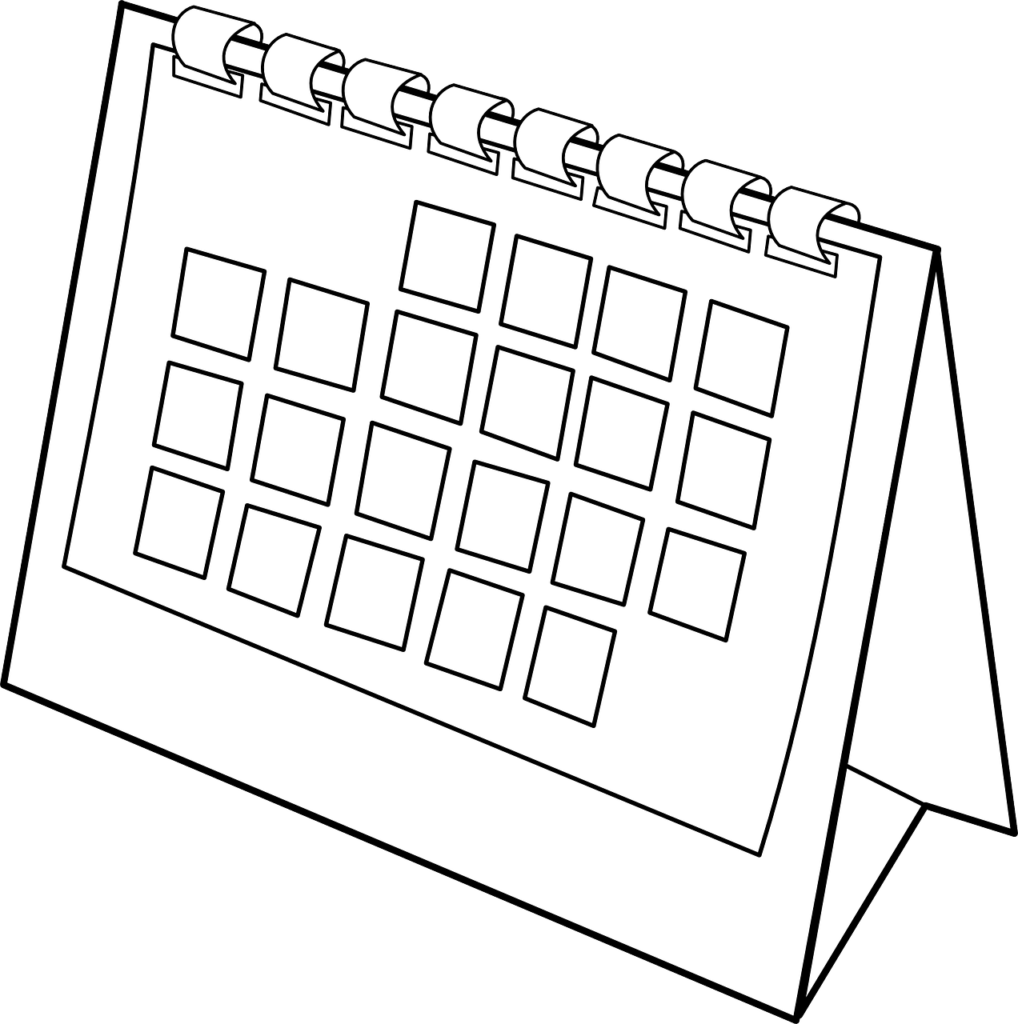You already know that the days of the week are essential to communicate and to have daily conversations. When you go to sleep, you start to think about what you will do tomorrow or in the next few days, don’t you? Maybe with your friends, you make plans for Friday night or next weekend? There are so many reasons to know the days of the week in Spanish.
In this post, we’ll study the use of the days of the week in Spanish. We’ll learn the days of the week, the weekend days, the rules on gender, articles, and capitalization, and so much more. Are you ready? Let’s dive in!
The Days of the Week in Spanish
Let’s get to the point! The days of the week in Spanish are:
| Days of the week | Días de la semana |
| Monday | el lunes |
| Tuesday | el martes |
| Wednesday | el miércoles |
| Thursday | el jueves |
| Friday | el viernes |
| Saturday | el sábado |
| Sunday | el domingo |
Let’s try using these in a couple of sentences:
- I hate Mondays! – ¡Odio los lunes!
- Saturday is my favorite day of the week. – El sábado es mi día favorito de la semana.
Are Spanish Days of the Week Capitalized?
Contrary to English, where the first letters of days of the week are capitalized, this is not the case in Spanish. Unless it falls at the start of a sentence, the days of the week in Spanish always begin with a lowercase letter. Let’s see a few examples to get used to this:
- The grammar exam is next Monday. – El examen de gramática es el próximo lunes.
- This Tuesday, we’re going to visit our grandparents. – Este martes vamos a visitar a nuestros abuelos.
- What day is today? It’s Wednesday. – ¿Qué día es hoy? Es miércoles.
- Next Thursday is going to be a very important day for our family. – El próximo jueves va a ser un día muy importante para nuestra familia.
- Our boss met with us last Saturday. – Nuestro jefe se reunió con nosotros el sábado pasado.
- Get ready for the presentation on Friday. – Prepárense para la presentación del viernes.
- We go to church every Sunday. – Nosotros vamos a la iglesia todos los domingos.
Abbreviations
Just as in English, we have a standard set of abbreviations for each of the Spanish week days. It’s very simple: just use the first three letters of each word!
| lunes | lun. | Monday |
| martes | mar. | Tuesday |
| miércoles | mié. | Wednesday |
| jueves | jue. | Thursday |
| viernes | vie. | Friday |
| sabádo | sab. | Saturday |
| domingo | dom. | Sunday |
Which is the First Day of the Week?
This question can spark a bit of debate. Our point here is simply to note that there are a couple of right answers in Spanish.
In the United States and several other English-speaking societies, calendars show Sunday as the first day of the week, with the five weekdays in the middle. In a lot of the world, however, calendars start on Monday, with both the weekend days at the end.
In Spain the calendars definitely fall into the latter category, whereas in Mexico, Puerto Rico, and many other Latin American countries the standard is the same as in the US: the week starts on Sunday. In other words, either one can be right!
To bring together the previous two sections, let’s see how a month might appear in a calendar in Spain. Note how the Spanish week begins on Monday!
Marzo 2022
| lun | mar | mié | jue | vie | sab | dom |
| 1 | 2 | 3 | 4 | 5 | 6 | |
| 7 | 8 | 9 | 10 | 11 | 12 | 13 |
| 14 | 15 | 16 | 17 | 18 | 19 | 20 |
| 21 | 22 | 23 | 24 | 25 | 26 | 27 |
| 28 | 29 | 30 | 31 |
To get a full introduction to the Spanish months and seasons, check out our related post on the months of the year in Spanish.
Week, Weekdays, and Weekends
How do we refer to these common groupings of days in Spanish? Here’s a quick list before we explain each one:
| the week | la semana |
| the weekdays | entre semana |
| the workdays | los días laborales |
| the weekend | el fin de semana |
La semana
The week
We use semana to talk about the seven days of the week.
- The week has seven days: Monday, Tuesday, Wednesday, Thursday, Friday, Saturday and Sunday. – La semana tiene 7 días: lunes, martes, miércoles, jueves, viernes, sábado y domingo.
Entre semana, Los días laborales
Weekdays, The work days
In English, the days from Monday to Friday are commonly called weekdays, but in Spanish, we say entre semana since the expression días de la semana also includes the weekend. In addition, when we talk about workdays in Spanish (no matter which days you work, even on the weekends), we are talking about días laborales.
- I don’t work on Saturdays, I just work on weekdays. – Yo no trabajo los sábados, solo trabajo entre semana.
- I’m too busy to go dancing on the weekdays. – Estoy demasiado ocupado para salir entre semana.
- During workdays, all contact should be made via email. – Durante los días laborables, todo contacto debe hacerse por correo electrónico.
El fin de semana
The weekend
When we talk about the weekend in Spanish, we’re referring to Saturday and Sunday, i.e., el fin de semana.
- I often travel with my family on weekends, but stay at home on weekdays. – Suelo viajar con mi familia los fines de semana, pero me quedo en casa los días de semana.
- This weekend is going to be awesome! – ¡Este fin de semana va a ser genial!
Are the days of the week singular or plural? What about gender?
Gender and number matter a lot when talking about the days of the week. Like most words in Spanish, los días de la semana must follow gender and number rules. The gender question is easy: days of the week are always masculine. Every article or adjective used to describe a day of the week should agree with the masculine rules.
What about the number? It’s often easy to notice if a word is plural because it ends in -s or -es, however this might be confusing with the days of the week in Spanish since most of them already end in -s. No worries though, since we always use articles with days of the week! Here are the days in singular and plural:
| Days of the week | Singular | Plural |
| Monday | el lunes | los lunes |
| Tuesday | el martes | los martes |
| Wednesday | el miércoles | los miércoles |
| Thursday | el jueves | los jueves |
| Friday | el viernes | los viernes |
| Saturday | el sábado | los sábados |
| Sunday | el domingo | los domingos |
Using definite and indefinite articles
You probably already noticed through the previous explanations and examples, that unlike English, days of the week in Spanish are always accompanied by an article.
Most of the time, you’ll usually use definite articles (el, los) since they refer to a particular day that we’re talking about. Sometimes you’re not talking about any specific day though. In this case you’ll use an indefinite article (un, unos).
Let’s see some examples using definite articles where we’re being specific:
- My grandparents come to visit every Saturday. – Mis abuelos vienen de visita todos los sábados.
- I can’t go to the theatre on Friday, but what do you think about Sunday? – No puedo ir al cine el viernes, pero ¿qué te parece el domingo?
Now, see these other examples where the exact day is somehow intentionally unspecified through the use of indefinite articles:
- One Sunday a month, my boyfriend and I go on a date and go to a restaurant. – Un domingo al mes mi novio y yo tenemos una cita y vamos a un restaurante.
- I think the concert is on a Saturday. I’m not sure. – Creo que el concierto es un sábado. No estoy seguro.
This, Next, Last, Every
In English, we frequently use expressions like this Friday, next Monday, last Saturday, and every Sunday to be more specific about the date or to talk about how often we do certain activities.
In Spanish these are pretty much the same, though the expressions are as follows: este viernes, el próximo lunes, el sábado pasado, and cada domingo or todos los domingos. Let’s focus on those one by one, alright?
Este [día] vs. el próximo [día], el [día] que viene
This vs. next
In English it’s common to talk about upcoming days using this… and next…. If today is Monday, then this Friday means we’re talking about four days from now, whereas next Friday generally refers to 11 days from now. The equivalents in Spanish also work like that: este viernes will happen sooner than el próximo viernes. But just like in English, sometimes it’s unclear whether we’re really talking about the day over a week away, or the next one coming up!
We will also often say el viernes que viene, using the verb venir: this phrase que viene indicates a coming day. It’s more or less interchangeable with el próximo.
- This Friday we will go to the café and study there. – Este viernes iremos al café estudiaremos allí.
- Let’s study next Wednesday – Vamos a estudiar el próximo miércoles. – Vamos a estudiar el miércoles que viene.
El [día] pasado
Last
We use the word pasado to refer to the last instance of a day like last Monday. We always use the definite article, while the word order can be either way: el lunes pasado or el pasado lunes.
- We went to the beach last Sunday. – Fuimos a la playa el domingo pasado.
- The party was last Saturday. – La fiesta fue el pasado sábado.
Cada [día], Todos los [días]
Every
When we have a weekly routine, we can say we do something every Monday or every weekend. There are two equivalents for this in Spanish, each with their own grammar rules: cada and todos los.
Let’s start with cada: the day is written in singular, with cada acting as the article.
- We must go to school every Monday. – Debemos ir a la escuela cada lunes.
- She needs to go to the doctor every weekend. – Ella necesita ir al doctor cada fin semana.
In the case of todos los, the days are written in plural, and we include the plural article los.
- We must go to school every Monday. – Debemos ir a la escuela todos los lunes.
- She needs to go to the doctor every weekend. – Ella necesita ir al doctor todos los fines de semana.
Conclusion
Mastering the days of the week in Spanish will help you understand and communicate when a given activity is happening. Hopefully this post has explained everything you need to know about using the days of the week for your daily discussions!
Now that you know how to use them, are you ready to give it a bit of practice? Great! Then we’ll leave you with a few questions so you can talk confidently about the days in Spanish!
- ¿Cuál es tu día favorito de la semana?
- ¿Trabajas los fines de semana?
- ¿Odias todos los lunes? ¿Por qué?
- ¿Qué vas a hacer el próximo sábado?
- ¿Qué hiciste el pasado lunes?
- ¿Qué haces cada miércoles en la noche?
- ¿Vas a la iglesia todos los domingos?
- ¿Cuáles son los días de la semana?




